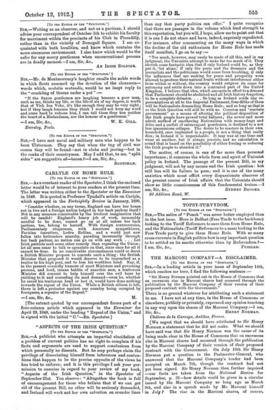"ASPECTS OF THE IRISH QUESTION."
[To THE EDITOR OP THE "SPECTATOR."]
Sin,—A publicist who attempts an impartial elucidation of a problem of current politics has no right to complain if his facts and arguments are used to support conclusions from which personally he dissents. But he may perhaps claim the privilege of dissociating himself from inferences and conten- tions that happen to be the precise opposite of the views he has tried to enforce; and it is this privilege I ask your per- mission to exercise in regard to your review of my book, " Aspects of the Irish Question," in the Spectator of September 21st. You observe : " Altogether the book is full of encouragement for those who believe that if we can get rid of the present Bill, no other will be seriously demanded, and Ireland will work out her own salvation on sounder lines than any that party politics can offer." I quite recognize that there are passages in the volume which lend strength to this expectation, but you will, I hope, allow me to point out that it is one I do not share and have, indeed, expressly repudiated. For instance, after commenting on the many ways in which the decline of the old enthusiasm for Home Rule has made itself manifest, I go on to say :-
" Too much, however, may easily be made of all this, and in my judgment, the Unionists attempt to make far too much of it. They cherish some fantastic idea that if only Ireland could be, as they put it, 'lot alone,' if only the poets and the dreamers and the journalists and the politicians would cease from troubling, if only the influences that are making for peace and prosperity were allowed to produce their natural fruits without interference either from within or without, the country would outgrow its craze for autonomy and settle down into a contented part of the United Kingdom. I believe that idea, which amounts in effect to a demand that Parliament should be abolished and all Irish history forgotten, to be a complete delusion. . . . So long as Ireland sends any re- presentatives at all to the Imperial Parliament, four-fifths of them will be Nationalists demanding Home Rule ; and so long as that is so the Irish Question will still be with us. Coercion and 'resolute government' as a means of altering the political disposition of the Irish people have proved total failures ; the newer and more adroit method of smothering Nationalism with money-bags and doles and a surfeit of extravagant pourboires, is destined to a not less ignominious collapse. The desire to be masters in their own household, once implanted in a people, is not a thing that easily dies; in Ireland it is imperishable. It may wax at one time and wane at another, but it always persists, and no calculation is sound that is based on the possibility of either forcing or seducing the Irish people to abandon it."
The matter, of course, is one of far more than personal importance ; it concerns the whole form and spirit of Unionist policy in Ireland. The passage of the present Bill, in my judgment, will not by any means end the Irish question : but still less will its failure to pass; and it is one of the many anxieties which must afflict every dispassionate observer of the present course of Irish affairs that the Unionists should show so little consciousness of this fundamental truism.—I










































 Previous page
Previous page